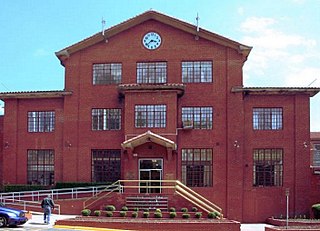Related Research Articles

Execution by firing squad, in the past sometimes called fusillading, is a method of capital punishment, particularly common in the military and in times of war. Execution by shooting is a fairly old practice. Some reasons for its use are that firearms are usually readily available and a gunshot to a vital organ, such as the brain or heart, most often will kill relatively quickly.

The Great Purge or the Great Terror, also known as the Year of '37 and the Yezhovshchina, was Soviet General Secretary Joseph Stalin's campaign to solidify his power over the party and nation; the purges were also designed to remove the remaining influence of Leon Trotsky as well as other political rivals within the party. It occurred from August 1936 to March 1938.

Hanging is the suspension of a person by a noose or ligature around the neck. The Oxford English Dictionary states that hanging in this sense is "specifically to put to death by suspension by the neck", though it formerly also referred to crucifixion and death by impalement in which the body would remain "hanging". Hanging has been a common method of capital punishment since medieval times, and is the primary execution method in numerous countries and regions. The first known account of execution by hanging was in Homer's Odyssey. In this specialised meaning of the common word hang, the past and past participle is hanged instead of hung.

The list of people executed by the U.S. state of Texas, with the exception of 1819-1849, is divided into periods of 10 years.
The NKVD prisoner massacres were a series of mass executions of political prisoners carried out by the NKVD, the People's Commissariat for Internal Affairs of the Soviet Union, across Eastern Europe, primarily Poland, Ukraine, the Baltic states, and Bessarabia. After the start of the German invasion of the Soviet Union on June 22, 1941, the NKVD troops were supposed to evacuate political prisoners into the interior of the Soviet Union, but the hasty retreat of the Red Army, the lack of transportation and other supplies and the general disregard for legal procedures often meant that the prisoners were executed.

The Red Terror in Soviet Russia was a campaign of political repression and executions carried out by the Bolsheviks, chiefly through the Cheka, the Bolshevik secret police. It started in late August 1918 after the beginning of the Russian Civil War and lasted until 1922.

Capital punishment in China is a legal penalty. It is commonly applied for murder, drug trafficking and financial crimes, although it is also a legal penalty for various other offenses. Executions are carried out by lethal injection or by shooting. The majority of Chinese people support capital punishment.
Wrongful execution is a miscarriage of justice occurring when an innocent person is put to death by capital punishment. Cases of wrongful execution are cited as an argument by opponents of capital punishment, while proponents say that the argument of innocence concerns the credibility of the justice system as a whole and does not solely undermine the use of death penalty.
Capital punishment is forbidden by the Charter of Fundamental Rights and Freedoms of the Czech Republic and is simultaneously prohibited by international legal obligations arising from the Czech Republic's membership in both the Council of Europe and the European Union.
Capital punishment is a legal penalty in Saudi Arabia. Death sentences are almost exclusively based on the system of judicial sentencing discretion (tazir), following the classical principle of avoiding Sharia-prescribed (hudud) penalties when possible. In recent decades, the government and the courts have increasingly issued these sentences, reacting to a rise in violent crime during the 1970s. This paralleled similar developments in the U.S. and Mainland China in the late 20th century.
This article lists the Mass executions in ISIL-occupied Mosul. Mosul, which is located in the Nineveh Governorate of Iraq, was occupied by the Islamic State of Iraq and the Levant (ISIL) from the Fall of Mosul on June 10, 2014, until the liberation of Mosul on July 10, 2017. Mosul is the second largest city in Iraq, and because of this, it was one of the Islamic State's largest bases, and their capture of the city was used in propaganda to demonstrate their military strength. Sunni Islam is the majority religion. Mass executions of civilians, enemy soldiers, and members of ISIL who were accused of offenses were a regular occurrence, and executions peaked during the Mosul offensive. Mosul was the site of many of ISIL's war crimes. This article is a timeline of recorded mass executions carried out by ISIL in and around Mosul.
References
- 1 2 The Espy File: 1608–2002. Death Penalty Information Center. Retrieved 23 February 2009.